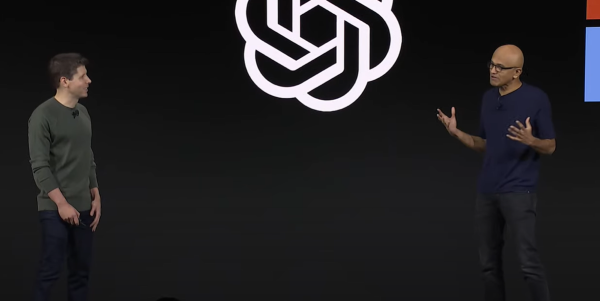Microsoft-Backed OpenAI: CEO Altman Out, ‘Not Consistently Candid’
‘The board no longer has confidence in his ability to continue leading OpenAI,’ according to a statement from OpenAI.

Sam Altman has left the CEO role at OpenAI, the organization known for its ChatGPT generative artificial intelligence product and work with Microsoft on GenAI.
In a statement published Friday on San Francisco-based OpenAI’s website, the organization said that Altman “was not consistently candid in his communications with the board, hindering its ability to exercise its responsibilities.”
“The board no longer has confidence in his ability to continue leading OpenAI,” according to the statement, which named Chief Technology Officer Mira Murati interim CEO effective immediately.
[RELATED: Microsoft Ignite 2023: CEO Nadella Declares An ‘Age Of Copilots’]
Altman Out At OpenAI
CRN has reached out to OpenAI for comment.
In a statement to CRN, a Microsoft spokesperson reiterated the vendor’s commitment to OpenAI.
“We have a long-term partnership with OpenAI and Microsoft remains committed to Mira and their team as we bring this next era of AI to our customers,” according to the statement.
Microsoft Partners React
Phil Walker, CEO of Network Solutions Provider, a Manhattan Beach, Calif.-based Microsoft partner and member of CRN’s 2023 MSP 500, told CRN in an interview that the vendor’s relationship with OpenAI is “important” amid an “arms race” in GenAI.
That arms race has included AI startup Anthropic receiving up to $4 billion from Microsoft cloud rival Amazon Web Services and AWS becoming the primary provider for mission critical workloads.
Ignite this week showed Walker how much Microsoft is investing in GenAI within its Azure cloud offering. “The amount of money that they’ve invested in it just shows that they’re committed to it,” he said.
An early dominance in GenAI has been important for vendors and their partners because the technology’s output is a strong argument for customers to consolidate their data and the tools they use to get more out of a vendor’s GenAI.
“The idea of putting all your eggs in one basket in the past may have been bad, but in an AI world … we might be bending (to) a new role,” he said.
Michael Goldstein, CEO of Fort Lauderdale, Fla.-based Microsoft partner LAN Infotech, told CRN in an interview that seeing Altman leave is “surprising,” but Microsoft giving its users the ability to use OpenAI-created large language models (LLMs) shows the strength of the relationship.
Microsoft has also dug into its strategy around expanding Copilot features throughout its product stack. “Now, Microsoft has a Copilot for everything,” he said.
Zac Paulson, director of product and strategy at ABM Technology Group, a Fargo, N.D.-based Microsoft partner, told CRN in an interview that “what Microsoft has done in just a short time with AI has been nothing short of amazing.”
It’s possible that Altman didn’t have much influence on the technology and innovation side of the organizations’ partnership, Paulson said.
The partnership “has taken AI to the mainstream really quickly,” he said.
Microsoft, OpenAI Relationship
Microsoft has reportedly invested $13 billion in OpenAI and has an exclusive license on the organization’s GPT-4 large language model (LLM) that generates answers in response to user queries.
Microsoft and OpenAI have partnered “to develop the underlying AI” in Microsoft’s Copilot GenAI tools. Redmond, Wash.-based Microsoft is also “developing and providing the supercomputing infrastructure that OpenAI services run on,” according to the tech giant.
During Microsoft’s annual Ignite conference this week, Microsoft CEO Satya Nadella praised the OpenAI partnership.
“It starts with our deep, deep partnership with OpenAI,” Nadella said. “They’re just doing stunning breakthrough work to advance the state of AI models. And we are thrilled to be all-in on this partnership together.”
Nadella even pledged that “as OpenAI innovates, we will deliver all of that innovation as part of Azure AI.” He announced a preview for OpenAI’s GPT-4 Turbo on Azure OpenAI Service, with token pricing at parity with OpenAI.
Nadella made a surprise appearance at OpenAI’s DevDay conference earlier this month, sharing the stage with Altman and telling him “we love you guys” and that the partnership has “been fantastic for us,” according to Business Insider.
Along with Altman’s departure and Murati’s promotion, Greg Brockman will leave his role as chairman of the board but will remain at OpenAI, reporting to Murati.
Altman left his role as president of startup accelerator Y Combinator in 2019 to focus on OpenAI, according to The New Economy. He became its president in 2014 and joined YC in 2011 as a part-time partner. He previously founded location-based social network Loopt in 2005. It sold to prepaid card issuer Green Dot in 2012 for $43.4 million.
In September, The Wall Street Journal reported that OpenAI was talking to investors about a share sale that would value it at between $80 billion to $90 billion – triple its level earlier this year. Microsoft owns 49 percent of OpenAI, which expected at the time to hit $1 billion in revenue this year.
On Monday, Altman told the Financial Times he planned to secure more financial backing from Microsoft as it worked toward artificial general intelligence (AGI).
Murati, the interim CEO, joined OpenAI in 2018 as vice president of applied AI and partnerships, according to an archive of her LinkedIn account. She took on the CTO role in May 2022.
Her resume includes about two years with Leap Motion, leaving the company in 2018 with the title of vice president of product and engineering. She spent three years with Tesla, leaving in 2016 with the title of senior product manager for Model X.